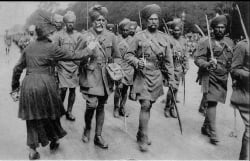Template:AOW341: Difference between revisions
Hari singh (talk | contribs) No edit summary |
Hari singh (talk | contribs) mNo edit summary |
||
| Line 4: | Line 4: | ||
With the outbreak of war in Europe, [[India]], the Crown Jewel of the British Empire, joined the Allies in battle on the 4th of August 1914. | With the outbreak of war in Europe, [[India]], the Crown Jewel of the British Empire, joined the Allies in battle on the 4th of August 1914. | ||
Contributing the most volunteers of any of the British imperial holdings that fought in the war, [[India]] produced between 900,000 to 1.5 million troops for combat by 1919. | Contributing the most volunteers of any of the British imperial holdings that fought in the war, [[India]] produced between 900,000 to 1.5 million troops for combat by 1919. | ||
Of these troops, the [[Sikh]]s, one of the two loyal 'martial races' of the British Raj, rallied in enormous numbers for the King, Empire, and the defence of Europe. | |||
At the beginning of the war, [[Sikh]] military personnel numbered around 35,000 men of the 161,000 troops of the Indian Army, around 22% of the armed forces, yet the [[Sikh]]s only made up less than 2% of the total [[Indian]] population. By the end of the war 100,000 Sikh volunteers joined the British Armed forces with a few Sikhs also contributing to the French Air Service and the American Expeditionary Force.<!---- | At the beginning of the war, [[Sikh]] military personnel numbered around 35,000 men of the 161,000 troops of the Indian Army, around 22% of the armed forces, yet the [[Sikh]]s only made up less than 2% of the total [[Indian]] population. By the end of the war 100,000 Sikh volunteers joined the British Armed forces with a few Sikhs also contributing to the French Air Service and the American Expeditionary Force.<!---- | ||
It is also said that some Sikh POWs, captured in Belgium, were believed to have been Muslims by the Germans and taken to Turkey to fight along side their fellow 'Mohammedans'. However, they still remained loyal to the British Crown and escaped on a long trek to the British posts in Afghanistan, from Turkey through the Middle East, to once again fight under the British flag.----> {{aowf|Lions of the Great Wars}} | It is also said that some Sikh POWs, captured in Belgium, were believed to have been Muslims by the Germans and taken to Turkey to fight along side their fellow 'Mohammedans'. However, they still remained loyal to the British Crown and escaped on a long trek to the British posts in Afghanistan, from Turkey through the Middle East, to once again fight under the British flag.----> {{aowf|Lions of the Great Wars}} | ||
Revision as of 19:42, 10 November 2011
With the outbreak of war in Europe, India, the Crown Jewel of the British Empire, joined the Allies in battle on the 4th of August 1914.
Contributing the most volunteers of any of the British imperial holdings that fought in the war, India produced between 900,000 to 1.5 million troops for combat by 1919.
Of these troops, the Sikhs, one of the two loyal 'martial races' of the British Raj, rallied in enormous numbers for the King, Empire, and the defence of Europe.
At the beginning of the war, Sikh military personnel numbered around 35,000 men of the 161,000 troops of the Indian Army, around 22% of the armed forces, yet the Sikhs only made up less than 2% of the total Indian population. By the end of the war 100,000 Sikh volunteers joined the British Armed forces with a few Sikhs also contributing to the French Air Service and the American Expeditionary Force. .....More

